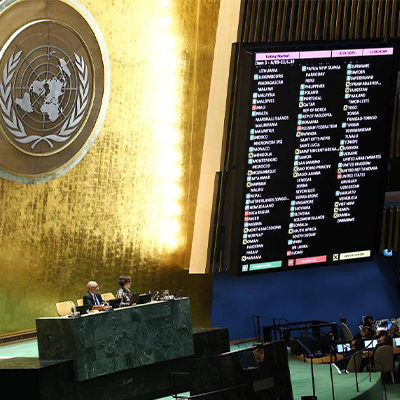M. Taylor Fravel | Chatham House
March 27, 2025

SSP Director, M. Taylor Fravel, joins leading experts to examine the US’s changing role and ambitions as a global power. In this recent research paper, he contributed chapter 2: "China: Balancing the US, increasing global influence."
China is actively seeking to balance US power and maximize its own international influence, through deep diplomatic engagement and global initiatives framed to exploit growing disquiet at the US-led world order.
Over the near to medium term, China’s vision for the future of international order is one in which the material power of the United States and the role of the liberal ideas it has championed are diminished relative to their position today. China’s vision, as held by China’s top leaders, contains three core elements. First, China articulates a Westphalian vision of order based on the primacy of states and on principles such as sovereignty, territorial integrity and non-intervention. In China’s vision, a state’s international influence should be commensurate with its capabilities – the logic of which confers special prerogatives on great powers with the greatest capabilities, such as China today. This vision bolsters China’s internal regime security and legitimates its own efforts to increase its international influence and occupy a leading position in the international system as it rises in power. Second, the main purpose of China’s vision of order since the end of the Cold War has been to reduce the influence of the US in an era in which liberal ideas along with US power have been ascendant. This enables Beijing both to decrease the ability of the US to harm or constrain China and to maximize its own freedom of manoeuvre and influence internationally. Third, China has pursued this vision of order much more actively and vigorously in the past decade, as its national capabilities have grown substantially and as its rivalry with the US has intensified.
One caveat is necessary. In today’s China, it is hard to identify open and stark differences among foreign policy elites, especially disagreements that might bear directly on the statements and positions of top leaders such as Xi Jinping, China’s president and general secretary of the Communist Party of China (CPC). Although one might be able to find signs of dissatisfaction with certain policies, it is hard to do so regarding foundational questions of foreign policy and grand strategy. Therefore, the analysis in this chapter assumes a consensus among Chinese foreign policy elites on China’s vision of international order.
China’s vision of international order
In early 2021, Xi described the US as ‘the biggest threat’ to China’s development and security.10 Chinese concerns about US power are long-standing. In the contemporary period, these began with the collapse of the Soviet Union and were expressed in the concept of pursuing a ‘new international order’ that reflected Beijing’s apprehensions about increased US power in the world. China viewed the material power of the US (including its network of military alliances) and its normative power (anchored in liberal norms and values) as threatening, although access to the US economy and global markets remained critical. As the dominant and unrivalled state in the international system in the post-Cold War era, the US was the only nation that could pose a long-term threat to China’s development and security. Thus, at its core, Beijing’s approach to international order has been about reducing its vulnerability to US power and increasing its own freedom of manoeuvre. Put differently, China’s approach to international order can be viewed as an attempt to balance US power and minimize US constraints on Beijing’s ability to exert influence and shape its external environment. It does this by emphasizing Westphalian ideas of sovereignty, territorial integrity, non-intervention and the formal equality of states, in contrast to liberal principles of openness, free markets, rules-based approaches and universal values.11
-M. Taylor Fravel
From Chatham House
